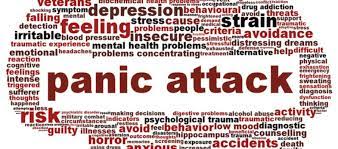Panic attacks are intense, sudden episodes of fear that can make you feel like you are losing control. The symptoms of panic attacks can range from heart palpitations to shortness of breath, and they can be debilitating for those who experience them. Understanding the triggers of panic attacks and learning how to reduce their frequency can greatly improve your quality of life. In this article, we will explore the common triggers of panic attack (napadaj panike) and provide helpful tips for reducing their frequency.
1. Understanding the Triggers of Panic Attacks: Panic attacks can be triggered by a variety of factors, including environmental, physical, and emotional factors. Some common triggers include stress, caffeine, medications, and certain medical conditions such as asthma or heart disease. Panic attacks can also be triggered by social situations, such as public speaking or being in crowded places. It is important to identify your personal triggers so that you can take steps to manage them.
2. Coping Strategies for Panic Attacks: Coping strategies can be helpful in reducing the frequency and severity of panic attacks. One effective strategy is deep breathing exercises, which can help to calm the body and reduce the symptoms of panic attacks. Another strategy is progressive muscle relaxation, which involves tensing and relaxing different muscle groups throughout the body to reduce tension and stress. Talking to a therapist or counselor can also be helpful in identifying triggers and developing coping strategies.
3. Lifestyle Changes to Reduce Panic Attacks: Making lifestyle changes can be an effective way to reduce the frequency of panic attacks. Avoiding caffeine and other stimulants, such as nicotine, can be helpful as they can increase anxiety and trigger panic attacks. Getting regular exercise and maintaining a healthy diet can also be beneficial as they can help to reduce stress and anxiety. Practicing mindfulness meditation or yoga can also be helpful in calming the mind and reducing anxiety.
4. Seeking Professional Treatment for Panic Attacks: For some people, panic attacks can be severe and debilitating, and may require professional treatment. There are several effective treatments for panic attacks, including cognitive-behavioral therapy (CBT), medication, and exposure therapy. CBT is a type of therapy that focuses on changing negative thought patterns and behaviors that can contribute to panic attacks. Medication, such as selective serotonin reuptake inhibitors (SSRIs) and benzodiazepines, can also be helpful in reducing the symptoms of panic attacks. Exposure therapy involves gradually exposing the person to their triggers in a controlled environment, in order to desensitize them to the triggers and reduce anxiety.
5. Self-Care for Managing Panic Attacks: Self-care is an important aspect of managing panic attacks. Taking time for yourself to engage in activities that you enjoy, such as hobbies and spending time with friends and family, can help to reduce stress and anxiety. Engaging in relaxation techniques, such as taking a warm bath or listening to calming music, can also be helpful in reducing anxiety. Practicing good sleep hygiene, such as going to bed at the same time every night and avoiding screens before bedtime, can also be beneficial in reducing stress and improving sleep quality.
Conclusion:
Panic attacks can be overwhelming and disruptive to your daily life. By understanding the triggers of panic attacks and learning how to reduce their frequency, you can take control of your anxiety and improve your quality of life. Coping strategies such as deep breathing exercises and progressive muscle relaxation, lifestyle changes such as avoiding stimulants and practicing mindfulness meditation, seeking professional treatment such as CBT and medication, and self-care such as engaging in relaxing activities and good sleep hygiene can all be helpful in managing panic attacks. Remember, you are not alone and there are effective treatments available to help you overcome your anxiety.
